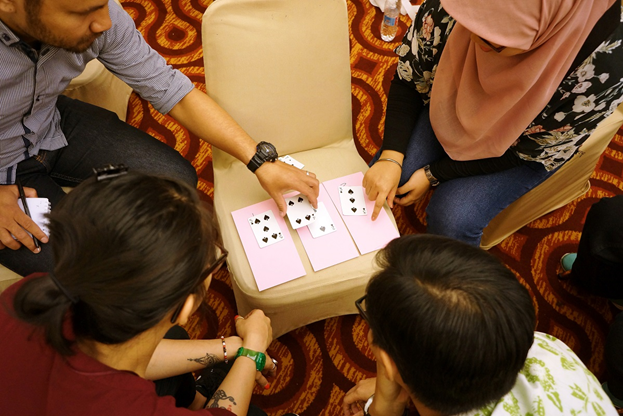by Ramadian Nugrahane
Like all strategic plans, a communication strategy must provide guidance in allocating resources effectively based on priorities and available resources. It must answer the question, “What will we do, and what won’t we do?” to accomplish goals and objectives.
This statement was conveyed by Paramita Mohamad, KSI’s communication consultant, who facilitated several sessions during a two-day communication strategy workshop held on 6-7 March in Bandung by KSI, together with the Tempo Institute. The KSI communication team and practitioners from the Tempo Institute facilitated the sessions in the workshop, which was organised to respond to an immediate need for KSI partners to improve effective research communication to support knowledge-to-policy processes.
Forty participants attended the workshop representing researchers, programme managers and communication specialists from KSI policy research institutes, the Indonesian Academy of Science (AIPI), the Indonesian Young Academy of Science (ALMI), Bappenas, the Ministry of Home Affairs, the Ministry of Villages and LAN. During the workshop, they worked in groups to enhance knowledge on the importance of communication as a strategic component in fostering the use of evidence-based knowledge and research for public policies, increase understanding on how to develop a communication strategy and plan, learn how to manage and implement integrated communication activities, and evaluate the results and outcomes of past communication work.
The workshop was designed using participatory approaches with experiential learning as the central method. Around 70 percent of the total time was allocated for working in groups, which contributed heavily to successfully creating a learning and sharing space among partners on the successes and failures in implementing communication activities. The sharing activities should benefit future communication activities in each organisation by replicating the same successful steps or avoiding the same mistakes.

Participants in the two days’ workshop of Communications Strategy in Research played the game “Tower of Hanoi” using cards to learn how to think strategically to achieve the end goal
KSI Communication Manager, Vira Riyandari, elaborated in her talk about the steps that need to be taken by an institution to develop effective and successful research communication strategies. These include the commitment to make available necessary budget and competent human resources, situational analysis to better understand the internal and external factors, such as political context that may influence implementation of the research, mapping out stakeholders and knowing the target audience, understanding the purpose of communication in the research, and selecting effective methods and a mix of media in communicating information. She emphasised that the metrics of communication activity outcomes are not the number of communication materials produced, but whether the communication products meet what people expect or would love to see, which in the end, will increase interest as well as the number of stakeholders or target audience.
Participants were asked to complete a communication framework sheet of the presentation they chose. It included identifying factors that made the communication activities successful, and writing a communication strategy and way of thinking behind the communication activities. This group exercise emphasised that communication functions are not merely about packaging and producing tools, but rather about strategic thinking, making the right decision, and research. It also helped the participants to understand the links between the case studies being presented and the communication strategy framework introduced during the first day.
One of the takeaways from the lessons learned presentations and discussions on the second day was that media engagement needs to include activities, such as collaboration with the media in investigative reporting, reframing the issue to interest the media, and understanding the logic, nature, and working environment and culture of the media. Unfortunately, capacity in developing strategic media engagement is uneven across policy research institutes. Based on the proposal from the participants, the KSI communication team and Tempo Institute will organise and facilitate the next workshop on Media Engagement Strategy for KSI strategic partners, currently planned for the first week of May 2017.






